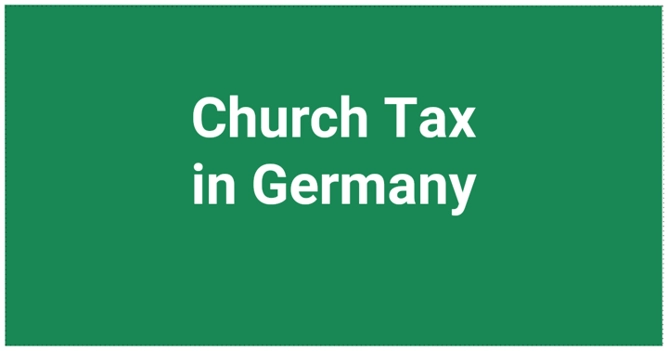
Church Tax (Kirchensteuer) in Germany - [2024]
Church Tax was started in 1919 as half of the German population is either protestant or catholic. Catholics, Protestants, and Jews need to contribute to the church tax (Kirchensteuer) based on the person’s income and the residence state. Income tax is divided equally between Bavaria and Baden-Wurttemberg, with the other states receiving 9% each. The Protestant churches received 6.63 billion Euros from church tax in 2021, according to Statista.
Church Tax (Kirchensteuer)
Members of certain religious congregations in Germany should contribute to the church tax (Kirchensteuer) which is paid to the German tax authorities who transfer it to the appropriate religions. It is subtracted automatically from monthly income of Protestant, Catholic, and Jewish.
Why Church Tax?
The church tax system, rooted in the pre-Christian Germanic tradition, holds that a tribe’s leader was responsible for the upkeep of the relevant religious group.
The idea of community ruler maintenance remained the conventional practice in most Western European nations, and then adopted by Christian faiths.
Local rulers took the responsibility of church upkeep during the Reformation period and the finances of churches were controlled by the state, so they became financially self-sufficient. The church tax took the place of the state benefits that churches had previously received at this time.
Church Tax Payer
The German church tax is owed by all members of a religion that collects taxes in general. That’s simple for baptized Germans, but complicated for expats.
When you register with your local citizens’ office, you need to mention your religion in the Anmeldung form with the below abbreviations;
- ev – Evangelical
- rf – Reformed
- rk – Roman Catholic
- is – Jewish
What For A Non Religious Person?
Enter “oa” (“keiner öffentlich-rechtlichen Religionsgesellschaft angehörig”) or a dash – in the form, if you are not religious. Remember that you might need to pay hundreds of Euros after ticking “not religious” on your registration form and you found to be baptized in your home nation or attended services on a regular basis. You might be sued with a hefty fine if German churches contacted churches abroad for information on their members. You need to pay the church tax if you were previously religious. You must register and pay church tax if you want to join a Catholic, Protestant, or Jewish community or use their facilities to get married, baptize a kid, or have a Christian burial.
Amount of Church Tax In Germany
The German tax office (Finanzamt) collects the church tax on behalf of the religious organizations. It is 8–9% of your income tax that you can see in your German salary slip. It is transferred to your selected religion during city registration.
Let’s assume your gross salary is 50,000 Euros, and annual tax liability is 20% which is 10,000 Euros. You’ll pay around 800-900 Euros as church tax which increases with time. You can claim it as “special expense” on your yearly tax return to lower your taxable income.
Enter Church Tax On Tax Declaration
You can declare both your prepaid and postpaid church taxes. Your income tax is reduced, and the church tax is calculated from it, by declaring and deducting these taxes from your income. You may claim this as a donation on the Special Expenses Form (Anlage Sonderausgaben) of your tax return if you have paid money to churches.
Process of Leaving Church and Stop Paying Taxes
You can leave church (Kirchenaustritt) and stop paying taxes if you’ve unwittingly joined the church. It may take time and be exceedingly bureaucratic.
Cost to Renounce Church Membership
It costs around 30 Euros to renounce your membership. You need to apply to the local administrative court (Amtsgericht) or registry office (Standesamt) with your registration certificate, marriage certificate, and identification document. Visit the Kirchenaustritt.de to go through the process.
Austrittsbescheinigung
Get an Austrittsbescheinigung (exit certificate) once you are done with the process and demonstrate that you are no longer a church member. Tax payments will also stop within a few months.
Conclusion
Catholics, Protestants, and Jews pay 8 to 9% of their income tax as church tax. This is collected by the German tax authorities and paid to the relevant religious groups. You can stop giving the tax if you are no longer a member of the religious group for which you need to apply to the court and registry office.

Jibran Shahid
Hi, I am Jibran, your Fellow Expat living in Germany since 2014, With my 10 years of experience, my aim is to bring you the well researched guides about life in Germany


![German Handelsregisternummer (Commercial Register Number) - [2024]](https://navigategermany.com/images/a-german-handelsregisternummer/feature-image-668w.webp)


